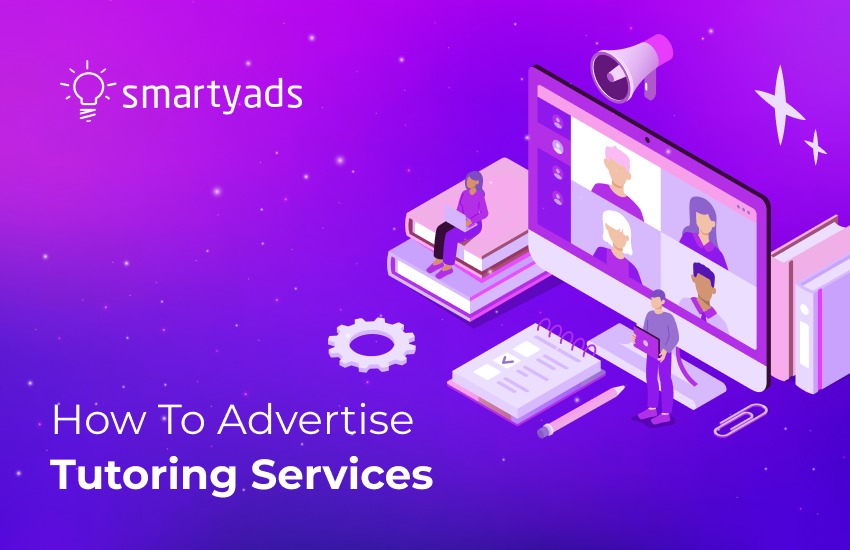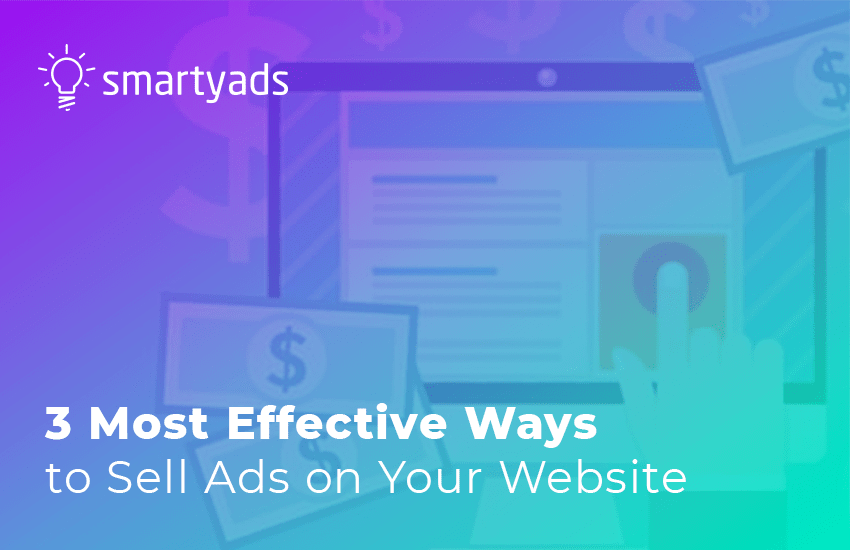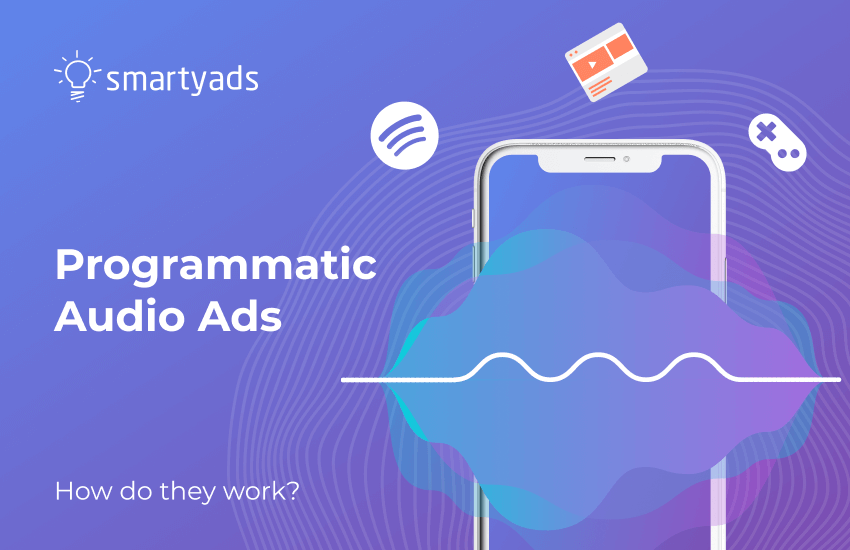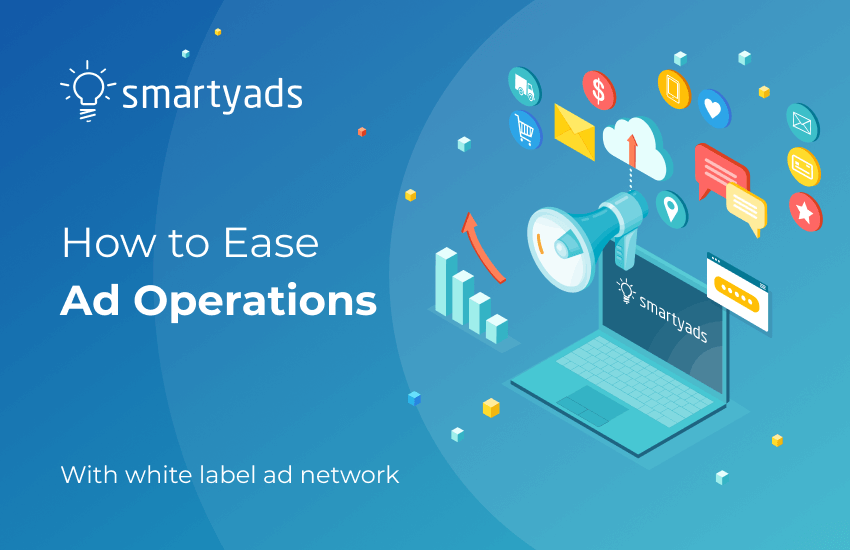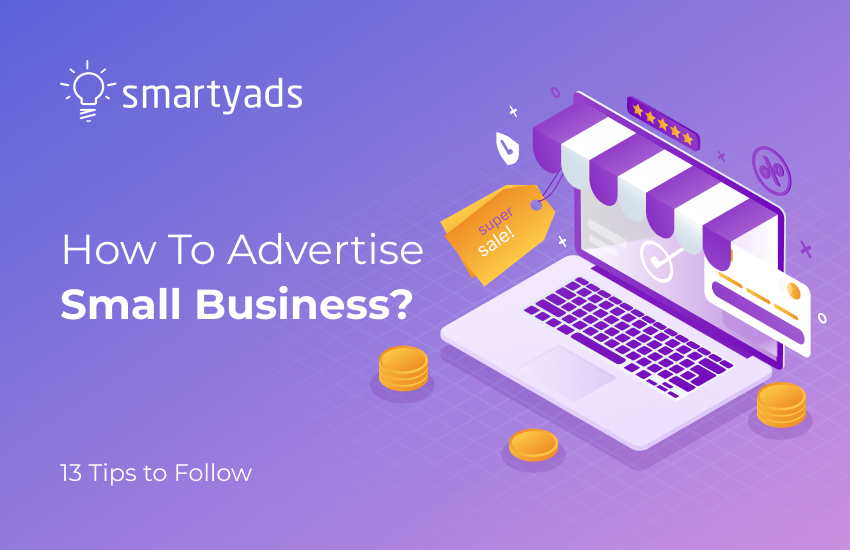A few decades ago, tutoring services and any tutoring business heavily relied on word of mouth. However, since the world is getting increasingly digital, the tutoring industry must adopt more effective advertising tactics.
Severe competition is another reason for doing so for tutoring services. In 2020, the global private tutoring market size reached $92.59 billion. By 2028, it's expected to exceed $171 billion.
Nowadays, being a knowledgeable tutor is not enough to succeed — your experience must be boosted with a proper advertising strategy. This article will share some insights on advertising your tutoring business. Whether you're a private tutor or an agency striving for a higher conversion rate, this guide is for you.
What are tutoring services?
Tutoring services are sometimes confused with teaching, so before we start, let us clarify the difference.
Teaching means working with large groups within school hours and based on a strict curriculum. This approach to learning is implemented in schools, colleges, and other educational institutions.
In turn, tutoring addresses gaps in the student's knowledge and implies giving lessons to individuals or small groups. Sessions, techniques, and materials are tailored to the client's needs.
The profits of private tutors or agencies depend on the number of learners, so investing in online advertising is essential for them.
Promoting tutoring business: Preparations
Before you start, you need to get ready. The required steps for private tutors and agencies are similar, with slight differences.
Identify your UVP
UVP (unique value proposition) is a short statement outlining the value you create for customers. Making it unique is essential since this will help prospective clients choose you over your competitors. A UVP can comprise the following:
- Main area (or areas) of expertise. In your UVP, focus on the primary subject area you're the best at;
- Awards. If you were recently awarded for teaching your main subjects, mention this;
- Techniques and values. Specify your values and teaching practices — learners tend to prefer tutors whose ideas and techniques are relevant to them.
Your UVP should be short but strong at the same time. It must inspire students to choose you while more details can be provided on the website.
For agencies, the suggestions on what should be outlined in a UVP are the same. Highlighting your unique value is important, so consider researching your competitors to detect opportunities.
Polish your tutoring website
As a private tutor, you can join various platforms like Preply to find clients. However, if you sign up for such a platform, you will likely have to pay a commission for conducting classes.
To protect your income and get rid of any limitations, you need your own place on the Internet — a website.
There are enough website builders that require no coding skills, so you don't have to hire a developer.
What content to add to a private tutor website?
Apart from having a user-friendly interface and being optimized for search engines, your website should deliver the following content and functionality:
Your portrait. Students should know what you look like, so choose a photo where you look professional but at the same time friendly.
UVP. Visitors should be able to notice it without scrolling, so it's better to place it at the upper part of the homepage.
Experience and the subjects you teach. While a UVP should be short, in this section, you can share additional details to assure your future students that you're the expert they are searching for.
Qualifications. Tutoring skills and experience are the most important factors for the majority of learners, but providing information about qualifications would be helpful in any case.
Academic and other awards. Here, you can list all the accolades you have.
Soft skills. In tutoring, soft skills are crucial, so remember to specify them. Hard skills can be added, too, if they are relevant to your area of expertise.
Availability. Tell your potential clients when you're available — for instance, Monday to Saturday, from 9 a.m. to 7 p.m.
Pricing. Your prices may be fixed or vary according to the subject (if you teach several of them) or other factors. In any case, explain to your visitors how your pricing works.
Contact details. Provide students with several contact options: phone, email, etc. You can also add links to your accounts on social media platforms.
Scheduling feature. For the students' convenience, consider adding this functionality to the website. They will be able to book tutoring sessions without your intervention.
CTA. Gently tell visitors what to do next. Create a strong CTA — for instance, "Book your lesson now". Clicking this link will then take visitors to the scheduling page.
These are the basic requirements. Apart from providing this information, you should also create a blog section and publish articles that will bring value to visitors and drive traffic.
A few words for tutoring agencies
For agencies, the recommendations mentioned above are relevant as well. However, to keep your website user-friendly, don't list all your tutors right on the homepage.
Instead, tell more about your agency in general and specify the subjects your tutors teach. Then, by choosing one of the categories, visitors will be able to go through the tutors' profiles. Each of them should be equipped with a short personal UVP to help clients make a choice.
The rest of the information can be added to the profile pages.
Alternatively, you may create a separate page for all the tutors and add filters by subject, years of experience, etc. Take a look at your competitors' websites to gain inspiration and detect opportunities to overcome them.
Here is an example of the Titanium Tutors' homepage:
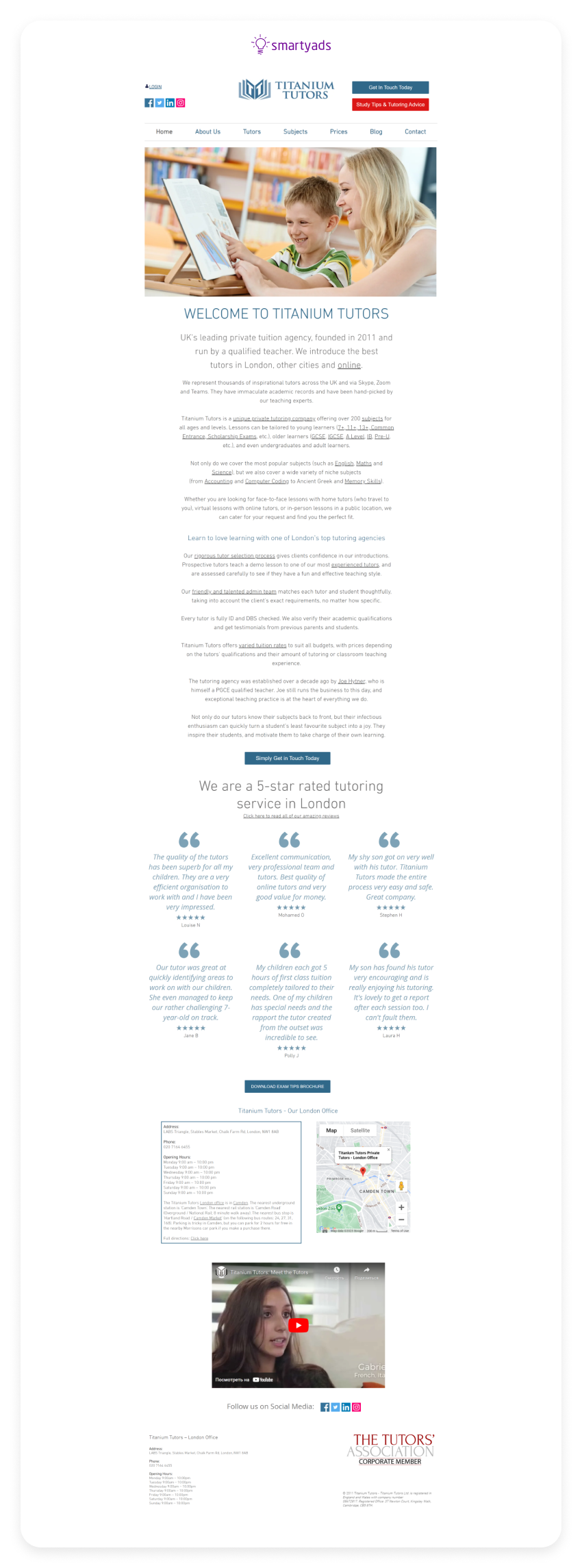
It is properly structured and offers a separate Tutors page, so it's easy for visitors to navigate the website.
It will also be useful for private tutors and agencies to add customer testimonials when possible.
Learn more about your target audience
The success of any advertising campaign relies on understanding your potential clients, so you need to learn as much about them as possible. This step is crucial for both agencies and private tutors, as knowledge of the audience allows more effective targeting.
Questions to answer
- What are the demographics of your audience?
- What are your clients' hobbies?
- What challenges do they face, and how can you help to overcome them?
- How much are they willing to pay for the lessons?
- What social networks do they prefer? Are there any other third-party websites they visit often?
- What content formats do they interact with the most?
- What are their preferences in terms of communication?
By answering these questions, you will discover where to find customers and how to attract their attention.
Where to get this data?
Please note that you may have to prepare not one but several customer persona profiles. If you have already been delivering tutoring services for a while, you can gather this data by analyzing your past and current clients.
If not, analyze your competitors' audiences and consider making assumptions. Then, after you attract some students, make sure to review these assumptions and refine the profiles if needed.
Prepare marketing materials
Before promoting your business, you must create relevant marketing materials. Here are several ideas:
Guest blog posts
Besides writing articles for your website, consider creating guest blog posts for relevant third-party platforms. These can be websites related to education, websites of local schools and universities, etc. If you deliver valuable content, it will be easier for you to build trust and drive traffic.
Guest blog posts are also effective in terms of organic marketing efforts. If a link to your website is published on a reputable platform, search engines will consider your website more credible and relevant so that it will have higher rankings.
Social media posts
You must be active on social networks to build a strong online presence. Publish some content there prior to advertising.
Make sure to deliver value. For instance, you can share tips on remembering new information or learning your subject more effectively. Do your best to keep your content unique.
Besides, remember to list your subjects and skills in your profiles and add a link to your website.
To make the most of social media, create personal and business profiles. This recommendation applies to both private tutors and agencies.
Emails
Consider creating a set of cold emails to attract clients. Equip every message with a catchy subject line and highlight your UVP.
Don't forget about personalization — address every individual by name and explain how you can solve their issues. The text of your emails should vary according to different customer persona profiles.
End every message with a CTA that will take email recipients to a relevant page of your website. For instance, if you offer them to book the first session for free, clicking the CTA button should take them to the booking page.
Demo lectures
Record an online demo to convince future students that you're a professional and prove your tutoring skills. Keep it short enough but valuable — if it takes visitors an hour to watch your video, most of them will likely drop it.
Before starting recording, make sure your camera and microphone can deliver a high-quality outcome. You may also need a tripod, extra lighting, and other equipment — this depends on your conditions and requirements.
As a tutor, don't neglect to invest in proper equipment. You will use it not only for demos but also when conducting classes.
Digital ads
Consider launching paid advertising campaigns on Google and social networks to enhance reach. When designing your ad creatives, keep in mind the requirements of the selected platforms.
As for the ad copy, focus on the most essential things. Specify your main subject and the years of experience, and outline your UVP. The text must be short but memorable and compelling.
To improve recognition, keep your paid ads consistent in terms of colors, tone of voice, and overall style.
Note that some platforms (like Facebook) allow A/B testing, so you can prepare a set of tutoring ads and find out which of them brings better results.
Business cards
Business cards may seem old-fashioned, but when designed in a creative way, they can be very effective.
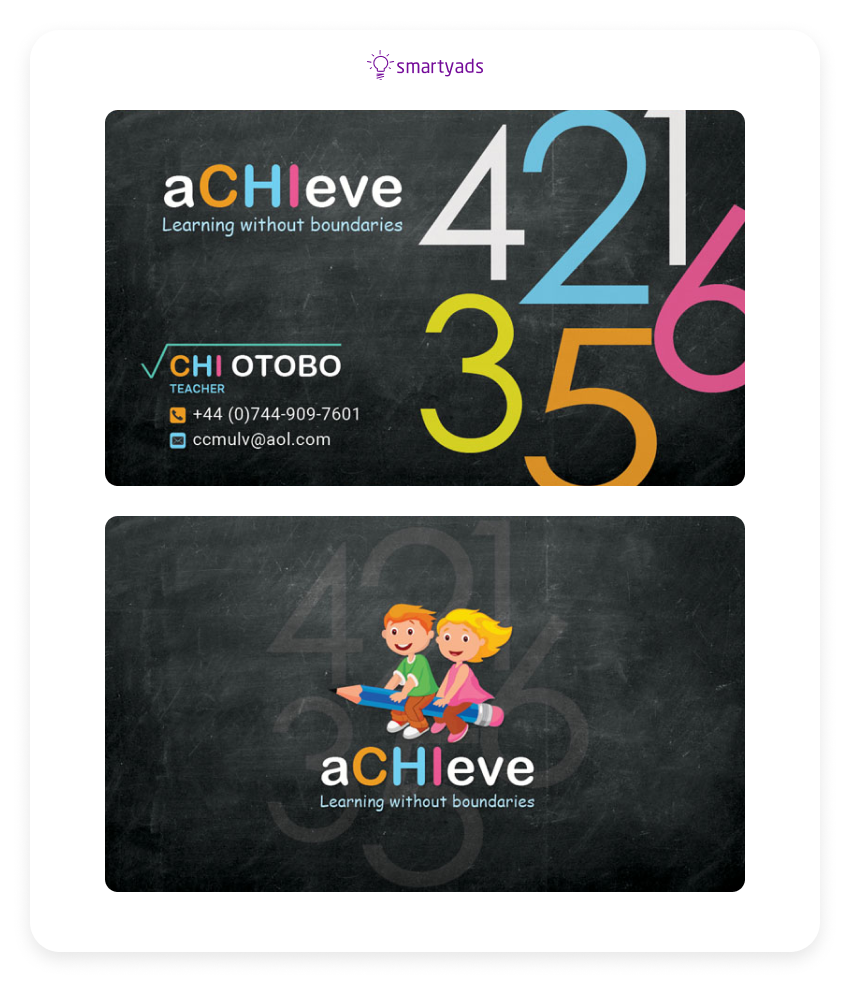
You can add to the card the following details:
- A name;
- A logo;
- A brief description of your services;
- Contact details (add several options);
- Website address;
- Social media pages.
Refrain from providing all the details on the same side of a card. Otherwise, it will look overloaded.
How and where to advertise tutoring services?
There are numerous ways to promote your offer, and we have already listed some tips here, including social media marketing, paid and local advertising, blogging, etc. Feel free to use them. Now, let's focus on additional things you can do.
Build landing pages
Create landing pages to advertise your business and convince visitors to take the desired action and convert.
While the website provides all the information you need and want to share with the audience, a landing page works as your salesperson. For instance, a user clicks an ad promoting your free session and then lands on the page where the only possible action is to book this session. This limited freedom of action will keep them focused, making them more likely to convert.
Thus, before you launch any tutor advertising campaign, consider building a relevant landing page. Provide the most essential information but, at the same time, focus on the desired action for this particular campaign.
Attend relevant events
To attract clients and grow your professional network, take part in education events (college fairs, open days at universities, etc.). Join online or in-person, interact with other attendees, and distribute business cards and other marketing material when possible.
You can also participate in parents' meetings in local educational institutions. Obviously, this can be done only with the prior consent of schools, colleges, or universities.
Offer free sessions
For tutors, building trust is a crucial thing to do. Therefore, consider allowing potential learners to have the first session with you for free.
For students, this will be a chance to ascertain the relevance of your techniques and skills without investing anything. If you meet their requirements, they will likely sign up for paid lessons and recommend you to their friends.
Besides, you can organize free webinars. You will have many more visitors to pay attention to than when focusing on a single student, but this approach can help increase the conversion rate.
Promote on educational websites
Google and social media are excellent channels, but you should not limit yourself to them. Your potential learners and their parents may visit various educational websites; you should be there for them.
Search for websites relevant to your area and suggest them to cooperate. They can promote your business, and you, in exchange, will advertise them to your audience.
Benefit from your network
If you have any connections among tutors and teachers, use them to promote your tutoring service. These include connections in local schools, on LinkedIn, etc. Select professionals who are not your direct competitors.
For example, if your primary area is preparing students for the IELTS exam, you can call in a favor from a general English teacher.
Advertise tutoring services with programmatic
Promoting tutoring business online can be a rather time-consuming task, as you have to prepare creative materials, select the right channels, set up targeting, etc.
With programmatic advertising platforms, this process gets significantly simpler. Powered by AI and ML, they allow advertisers to run highly targeted and measurable campaigns.
In essence, within DSP (Demand Side Platform), you set up your campaign, and the system automatically "cooperates" with the supply side platform to purchase the ad space on the suitable inventory. For the optimal price, your tutoring ads are shown to users who comply with your audience's characteristics, so your conversion rate will grow.
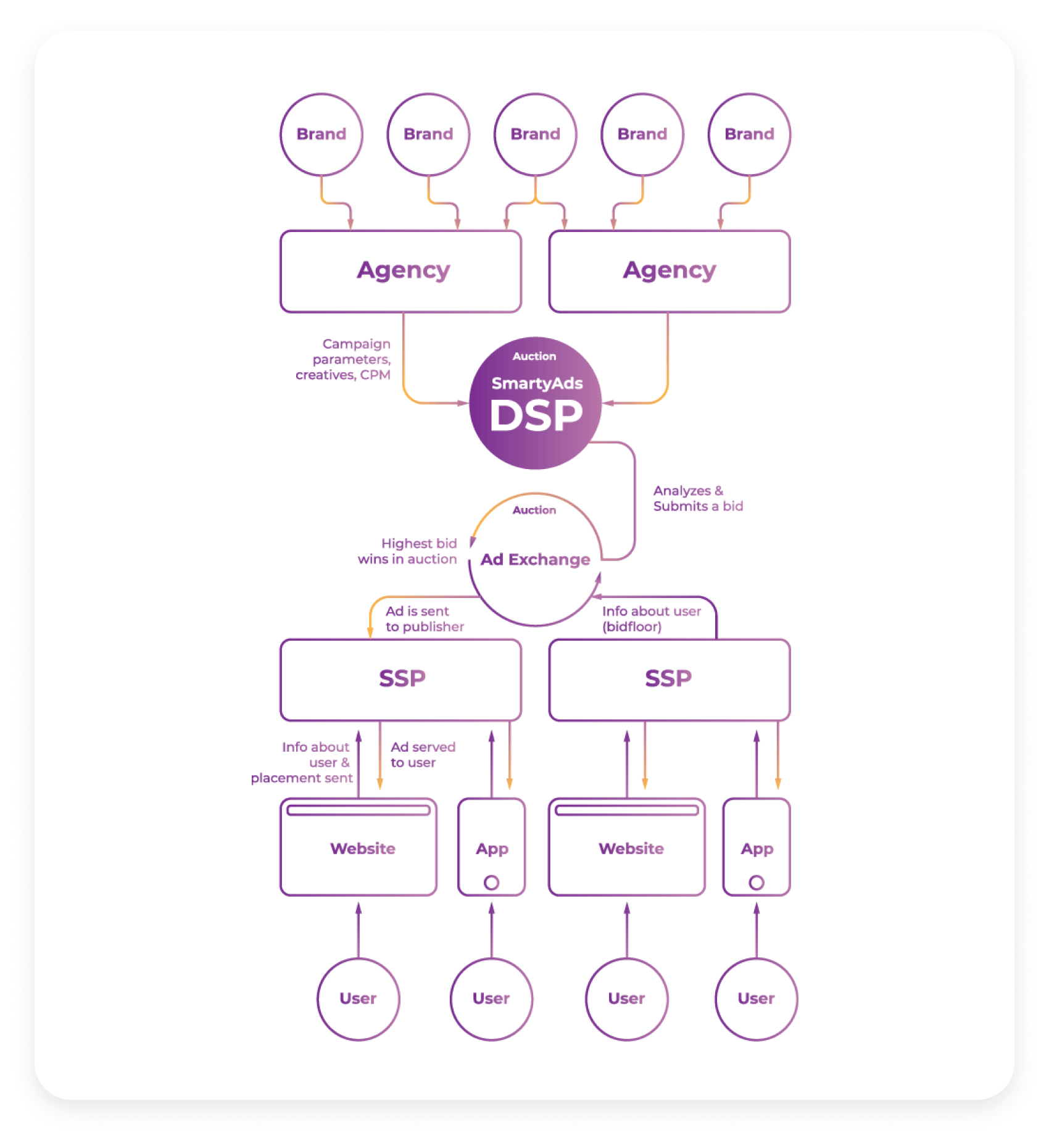
Learn more about the DSP principles of work here.
Another benefit in terms of saving time is that some platforms (like SmartyAds) have autoresize feature. Instead of customizing your visuals for every specific channel, you can turn it on, and your creatives will be automatically resized to fit their placements.
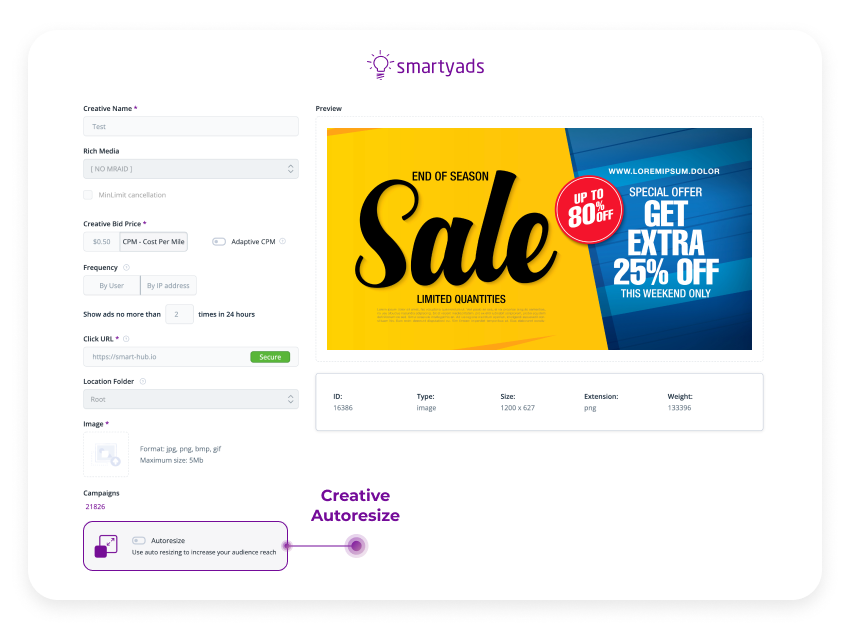
FAQ
To provide you with more information regarding SmartyAds DSP, let us answer several frequently asked questions.
What formats does SmartyAds DSP support?
The available formats are as follows:
- Banner, native, rich media, and audio ads (desktop, mobile web, in-app);
- Video ads (desktop, mobile web, in-app, CTV);
- Digital out-of-home.
What targeting options does SmartyAds DSP offer?
As an advertiser, you will be able to target your potential clients according but not limited to:
- Geolocation;
- Age;
- Gender;
- Income;
- Time zone;
- Time of the day;
- Language;
- Browser;
- OS;
- Device brand.
Can I set up my advertising budget distribution?
Yes, with SmartyAds DSP, you can limit your daily spending and the number of daily impressions per visitor/IP.
Does SmartyAds DSP have reporting features?
Yes, reports are generated automatically, so you can track all the metrics in real time, including the number of served impressions, clickthrough rate, engagement rate, ad spent, and many more.
To sum up
Offline and online tutoring will always be in demand, which means that the market will keep growing.
To overcome your competitors, you need to apply marketing efforts across various channels, including your website, social media, etc. You must come up with your value proposition and promote it to the right customers at the right time.
With programmatic platforms, you can advertise your tutoring business to prospective clients who are most likely to be interested in them without wasting time on finding suitable ad inventory.
Everything is done automatically so that you can focus on more important things. For instance, creating blog posts and preparing tutoring sessions for your students.
Advertise your tutoring services with a DSP platform. Register now!
